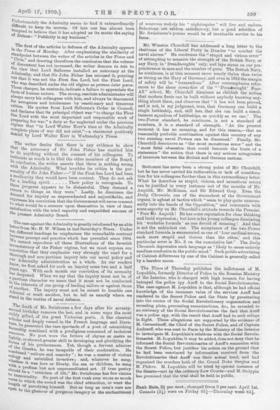The death of Mr. Swinburne a few days after his
seventy- second birthday removes the last, and in some ways the most richly gifted, of the great Victorian poets. A fine classical .„acnolar and deeply versed in the French language and liters- ?re, he presented the rare spectacle of a poet of astonishing lecundity combined with a ,prodigious command of technical lIesource. No poet wore the fetters of rhyme or metre so ghtlY, or showed greater skill in developing and glorifying the f °,11118 of his predecessors. Yet, though a fervent admirer 0 the Greeks, he was incapable of their moderation. He combined "culture and anarchy " ; he was a master of violent !111°g7 and unbridled invective ; and, whatever he sang, Whether it was love or liberty, the sea or children, he sang with a profuse but not unpremeditated art. If true poetry Should be a "criticism of life," Mr. Svrinburne has few claims 1.° immortality. No poet of the first rank ever wrote so much „7 ecae in which the sound was the chief attraction, or went the lent of parodying himself. But as long as men's ears are 0 Pen to the glamour of gorgeous imagery or the enchantment of sonorous melody his " nightingales " will live and endure. Selections are seldom satisfactory, but a good selection of Mr. Swinburne's poems would be of invaluable service to his fame.






































 Previous page
Previous page